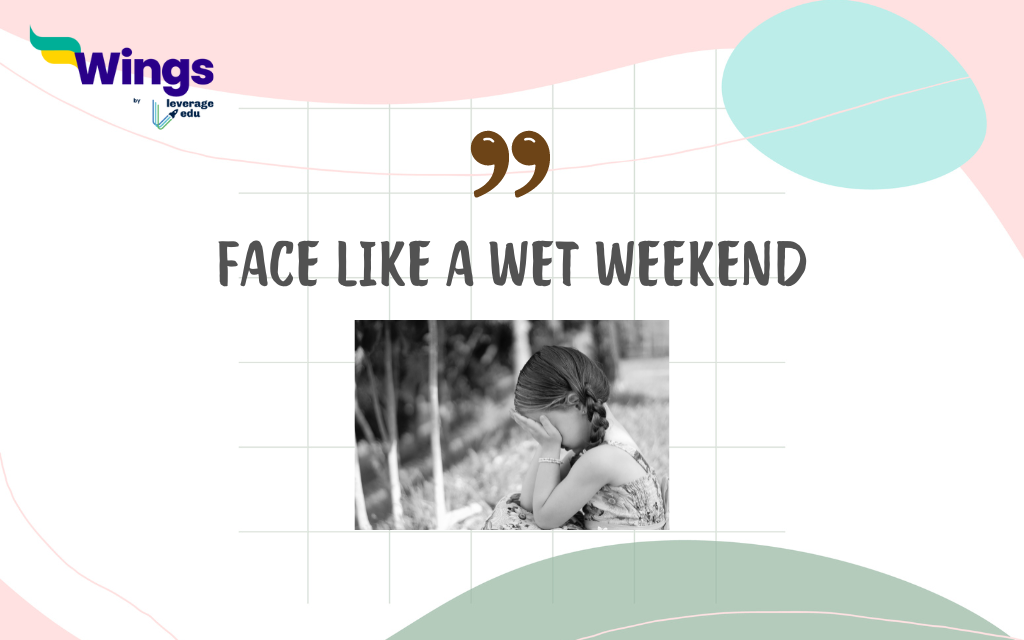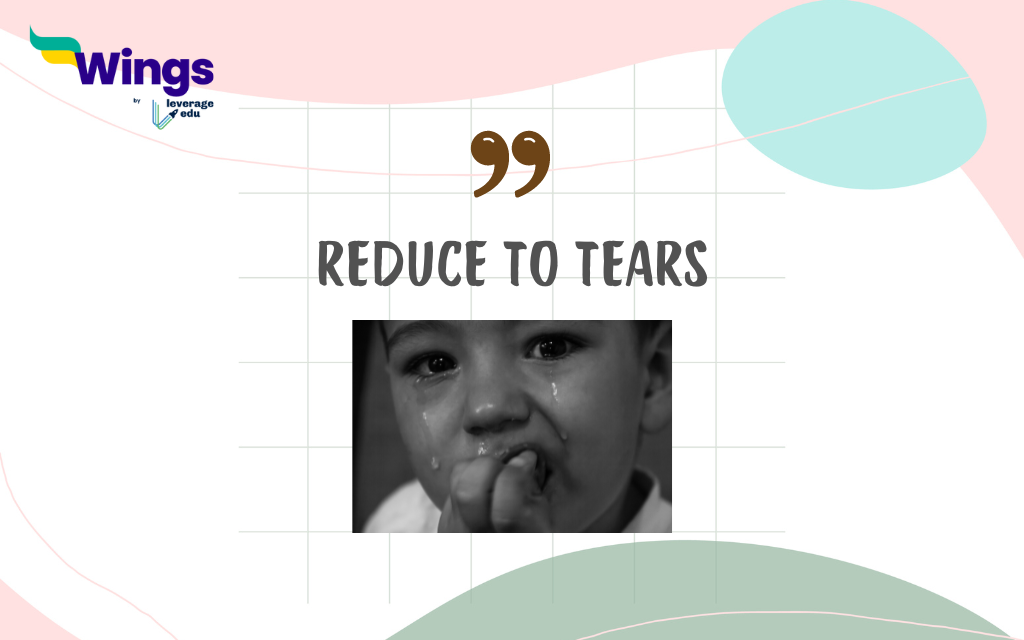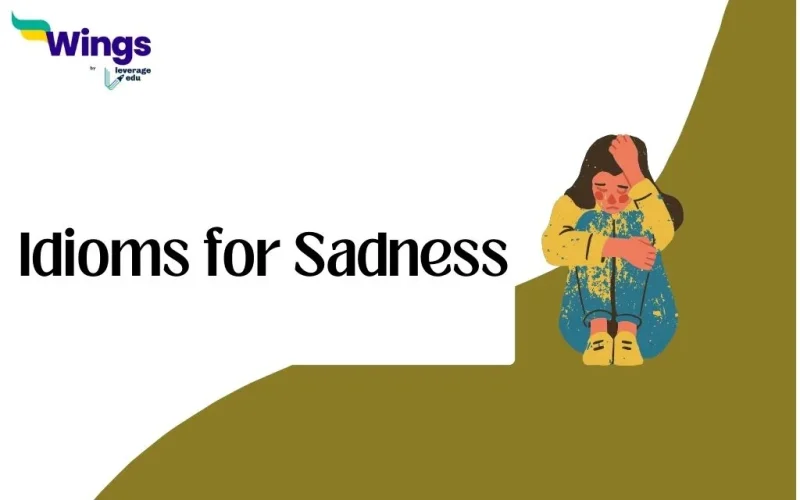Feeling blue? We all have those days when we’re down in the dumps or our heart feels heavy. Sadness can hit like a ton of bricks, leaving us crying over spilt milk or feeling like we are walking around under a dark cloud. But hey, every cloud has a silver lining! Expressing our emotions through idioms for sadness like “drowning in sorrow” or “down and out” not only adds colour to our conversations but also reminds us that tough times don’t last forever.
Let us now start to learn about some common idioms for sadness that may help you express vulnerability.
This Blog Includes:
Idioms for Sadness
Idioms for sadness beautifully capture emotional depth, like “carrying the weight of the world” or “brokenhearted,” which evoke profound sorrow. Phrases like “a heavy heart” or “down in the dumps” reflect melancholy vividly. These expressions offer shared understanding, helping us articulate feelings that words alone sometimes struggle to convey.
To help you cope with this situation, we have compiled a list of top idioms for sadness which will be quite apt for you.
Face Like a Wet Weekend
The idiom “face like a wet weekend” refers to someone who looks visibly sad, gloomy, or miserable. It describes an expression that reflects emotional distress or a downcast mood, often caused by disappointment or bad news. The comparison to a “wet weekend” emphasizes a sense of dreariness or discomfort, akin to the unpleasant weather associated with a rainy, uninviting weekend.
Example: What’s wrong with him? He’s got a face like a wet weekend.

Feeling Blue/To Have Blues
This idiom has been used numerous times in songs and films. Blue is related to melancholy, depression, and an unpleasant mood. We can use the expression “feeling blue” to refer to ourselves or others, but the phrase “have the blues” refers to others.
Example: It seems that you are feeling blue. Is there something wrong that you would like to share with me?
Also Read: Idioms for IELTS
Lump in Your Throat
Lump in your throat idiom is used when you get a tight feeling in your throat because of strong emotion, especially sadness. When we watch a movie that evokes strong emotions we often experience a sensation in our throat that indicates we may be on the verge of tears.
Example: I had a huge lump in my throat as I watched my sister get on the plane.

Reduce to Tears
The idiom “reduce to tears” means causing someone to cry due to overwhelming emotions, typically sadness, frustration, or despair. It highlights a situation where emotions become so intense that tears become inevitable. The idiom can also reflect vulnerability or sensitivity, whether prompted by harsh words, touching moments, or heartbreaking events.
Example: The movie’s ending reduced them to tears.

Also Read: Understanding Idioms: Examples and Meanings
Down in the Dumps
The idiom down in the dumps, describes feeling very sad, depressed, or discouraged. It conveys a sense of emotional low, often triggered by disappointment or personal setbacks. The “dumps” depict a gloomy, undesirable place, reflecting the mood of someone experiencing melancholy.
Example: He’s feeling a bit down in the dumps and needs cheering up.
Down in the Mouth
It derives from the fact that when a person is unhappy, the corners of the mouth are frequently turned down. This idiom is never applied to oneself. It is always used to describe someone else.
Example: She seems to be down in the mouth. Maybe she failed her interview.

Also Read: Rock the Boat
Take Something Hard
The idiom “take something hard” refers to someone being deeply affected or distressed by a particular situation, event, or remark. It signifies an emotional reaction where the person struggles to cope with disappointment, criticism, or loss. This idiom conveys vulnerability and sensitivity, as the individual internalises the impact more intensely than others might.
Example: Maybe she just took it too hard.

Also Read: Every cloud has a silver lining
In the Dumps
The idiom “in the dumps” refers to feeling extremely low, gloomy, or discouraged. It is often used to describe temporary sadness or a prolonged state of unhappiness caused by disappointing events or personal struggles. The phrase metaphorically places a person in a “dump,” symbolising an undesirable and dismal situation.
Example: Since losing his job, he’s been in the dumps and hasn’t wanted to go out.
Wear One’s Heart on One’s Sleeve
“Wearing one’s heart on one’s sleeve” means openly displaying emotions, especially sadness or vulnerability. The idiom originates from medieval jousting, where knights wore tokens from loved ones on their sleeves. It highlights someone’s inability or unwillingness to hide how they feel, making their emotions apparent to others.
Example: She wears her heart on her sleeve, so you can tell she is upset just by looking at her.
Tears Rolling Down One’s Cheeks
This idiom describes the physical act of crying, emphasizing the visible, uncontrolled outpouring of sadness. It paints a vivid picture of someone deeply moved by emotion, often due to loss or grief. Tears rolling down symbolize a heartfelt response to overwhelming feelings.
Example: Tears rolled down her cheeks as she read the farewell letter.
Beside Oneself with Grief
One of the most common idioms for sadness is “beside oneself with grief”. This idiom reflects a state of intense sorrow or emotional distress, where the person is overwhelmed and unable to maintain composure. It metaphorically suggests being so consumed by grief that one feels disconnected from their usual self.
Example: He was beside himself with grief after hearing the tragic news.
Broken Spirit
“Broken spirit” refers to emotional devastation, often caused by persistent failures, hardships, or betrayals. It reflects a loss of motivation, hope, or enthusiasm, symbolizing a person who feels defeated and struggles to recover emotionally.
Example: The constant rejections left her with a broken spirit.
All Cried Out
This idiom indicates exhaustion after prolonged crying, symbolizing emotional numbness or fatigue. It portrays the idea of someone having shed all their tears, leaving them unable to cry anymore, often reflecting a mixture of sadness and resignation.
Example: After hours of sobbing, she felt all cried out.
Heart in One’s Boots
“Heart in one’s boots” conveys a deep feeling of sadness, disappointment, or dread. It suggests a sinking feeling, as if the heart has dropped low into the boots, symbolizing emotional defeat or despair.
Example: His heart was in his boots when he realised he hadn’t made the team.
Sink into Despair
To “sink into despair”, one of the commonly used idioms for sadness, means falling into a profound state of hopelessness or grief. It depicts someone gradually losing all optimism as if being submerged in a deep, dark emotional void. This idiom highlights the overwhelming nature of such feelings.
Example: After the accident, he sank into despair and could not focus on anything.
In Low Spirits
“In low spirits” describes a state of sadness, lack of energy, or emotional demotivation. It often implies feeling downcast due to an unfortunate event or disappointment, where the person struggles to find joy or enthusiasm.
Example: She’s been in low spirits since her plans fell through.
Silent Tears
“Silent tears” signifies quiet crying, often experienced in solitude or when someone tries to hide their sadness. It reflects profound emotions, where the individual suppresses their grief yet cannot stop tears from falling.
Example: She shed silent tears while looking through the old photo album.
A Heavy Burden to Bear
One of the popular idioms for sadness is ‘A heavy burden to bear’. This idiom represents carrying an emotional or mental weight, such as grief, guilt, or responsibility. It signifies a struggle to cope with the heaviness of difficult situations or feelings that weigh someone down emotionally.
Example: Losing a loved one is a heavy burden to bear.
Lost in Sorrow
To be “lost in sorrow” means being entirely consumed by sadness, to the point of detachment from surroundings. It reflects an emotional state where grief dominates one’s thoughts, leading to isolation or distraction.
Example: He was lost in sorrow after the breakup, hardly speaking to anyone.
Tears at One’s Heart
This idiom signifies something deeply upsetting or emotionally painful, evoking a strong feeling of sadness. It suggests a metaphorical pulling or tearing at the heartstrings, symbolizing an intense emotional response.
Example: The sight of the abandoned puppy tore at her heart.
Explore more exciting reads below:
FAQs
One of the best idiom of looking sad is “Face like a wet weekend.” This idiom describes a visible expression of negative emotions.
“Face like a wet weekend.” This idiom is one of the sad phrases that describe a visible expression of negative emotions.
If you are sad, then one of the best ways to convey your feelings is by saying “one’s heart sinks‘ which describes a strong feeling of sadness.
Here are some common idioms for sadness:
“Take something to heart”
“Bawl one’s eyes out”
“Choke back tears”
“Cloud over the room”
“Overcome with grief”
To express sadness, describe your emotions honestly: “I feel overwhelmed” or “My heart feels heavy.” Use idioms like “down in the dumps” or “heartbroken” to convey feelings vividly. Writing helps too: “I can’t shake this emptiness.” Share vulnerably with someone you trust, saying, “I’m struggling right now,” to release and process your emotions.
“Overcome with grief” is an idiom describing someone so emotionally overwhelmed by sadness that they struggle to manage or express it.
“Heavy heart” is an idiom representing sadness or sorrow that someone is metaphorically carrying, often due to loss or disappointment.
Yes, “cry over spilled milk” refers to feeling sad or regretful about something that has already happened and cannot be changed.
“Take something to heart” describes being deeply affected or saddened by someone else’s words or actions.
“Bawl one’s eyes out” is an idiom used to describe someone crying intensely and uncontrollably due to overwhelming sadness or distress.
We hope this blog has provided all the necessary information on “idioms for sadness.” To advance your grammar knowledge and read more informative blogs, check out our Learn English page and don’t forget to follow Leverage Edu.


 One app for all your study abroad needs
One app for all your study abroad needs












 60,000+ students trusted us with their dreams. Take the first step today!
60,000+ students trusted us with their dreams. Take the first step today!